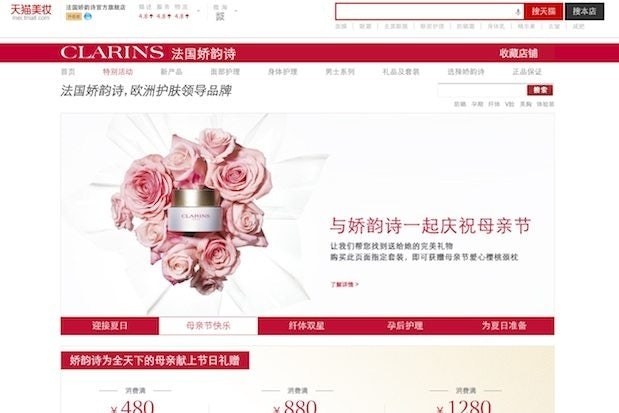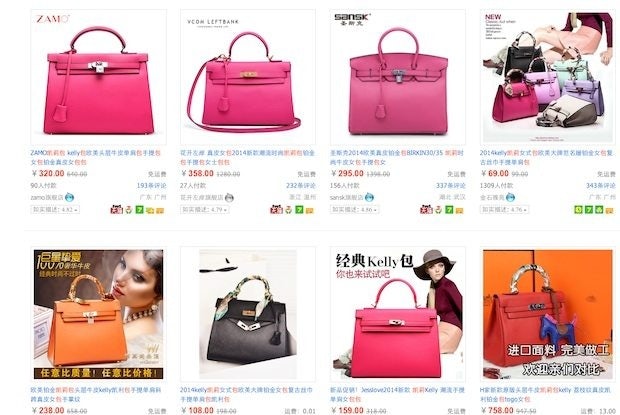
While luxury companies have been reluctant to dilute their image by joining Tmall, some international beauty brands have already done so. (Tmall)
With its massive U.S. IPO filing announced today, Chinese e-commerce giant Alibaba is the hot topic of discussion for both Silicon Valley and Wall Street. Although the site's enormous e-commerce success over the years has come from its mass-market oriented sales, the global luxury industry should also be paying close attention for several key reasons.
The owner of the gigantic C2C site Taobao and B2C e-tailer Tmall filed what is expected to become the largest IPO the United States has ever had. With a $1 billion placeholder amount, it could raise up to $20 billion—surpassing Facebook’s $16 billion—according to an estimation by Bloomberg. To put the sheer size of Alibaba in perspective, it has more sales than Amazon and eBay combined. As investors are abuzz about the risks and rewards of buying shares and the tech world speculates over the possibilities for future acquisitions, Alibaba’s global e-commerce domination is also set to make waves in the luxury sphere. Not only does the company process an enormous amount of China’s e-commerce transactions—an estimated 50 percent of all parcels delivered in the country come from Taobao and Tmall—but its recent focus on courting luxury brands to attract Western investors is likely to have a major impact on the future of luxury e-commerce in China.
For example, Taobao has been preparing for the IPO by striving to show that it’s serious about cracking down on the market of fake and smuggled luxury goods that are rampant on the site. Last October, the company signed a Memorandum of Understanding with top global luxury conglomerate LVMH to crack down on fake goods and protect intellectual property. The agreement named several proactive and preventive measures to fight counterfeits, including a takedown system to shut down web pages selling products by brands like Louis Vuitton.
This shows a strong effort on Taobao’s part to smooth relations with luxury brands after earlier controversies over fakes. In 2011, Taobao was sued by Swiss luxury watch brands Omega, Longines and Rado for the fact that counterfeit watches were available on the site. The deal with LVMH shows the company’s desire to assuage investor fears about the legitimacy of the site and demonstrate that it is actively trying to combat the problem.

Fake luxury goods are prevalent on Taobao. (Taobao)
However, the site is facing an uphill battle, given the fact that sales of both fakes and daigou items smuggled into the country to avoid tariffs are incredibly lucrative for both Alibaba and online merchants. Some experts believe that one of several reasons eBay failed and Alibaba thrived was the fact that eBay’s international standing meant it had to regulate counterfeits more stringently, while Alibaba remained unhindered.
Now that the company must appeal to global investors, however, it is making more efforts to increase trust and legitimacy. Tmall, which is known for cheap and discounted goods, is working to increase the prestige of its image with the addition of luxury brands to the site. A new Burberry Tmall shop was launched just a few weeks ago, marking the first time a foreign luxury fashion brand has joined since a test run by Coach was shut down after one month in 2011.
Burberry’s move to cash in on the site’s e-commerce power will likely shape the way other luxury brands view China’s e-commerce market. If successful—as many Western beauty brands have been—the new account could be a bellwether for other luxury brands looking for more e-commerce opportunities in China. Furthermore, it boosts the legitimacy of Tmall, which has its own problem with knockoffs.
In China, a number of additional Alibaba partnerships have shown the company’s faith in the profitability of luxury in the coming years. The company is setting its sights on online-to-offline (O2O) retailing: it recently teamed up with Shanghai luxury outlet Mega Mills to run promotions on Taobao, and announced in March that it is buying $214 million worth of shares in Beijing-basesd department store group Intime.
Meanwhile, the company has also been making acquisitions to build brand awareness and trust in the United States. It recently announced its investment in U.S. vintage luxury e-commerce site 1stdibs, and will soon be launching U.S. e-commerce site 11 Main, which will be offering “interesting, quality products” from “hand-picked shop owners.”
The question that remains is whether or not Alibaba will be able to develop the trust it's trying to build with Western companies and investors. Regardless of its rate of success, the company's massive presence in China's e-commerce market means it can't be ignored by the luxury industry in the coming years.